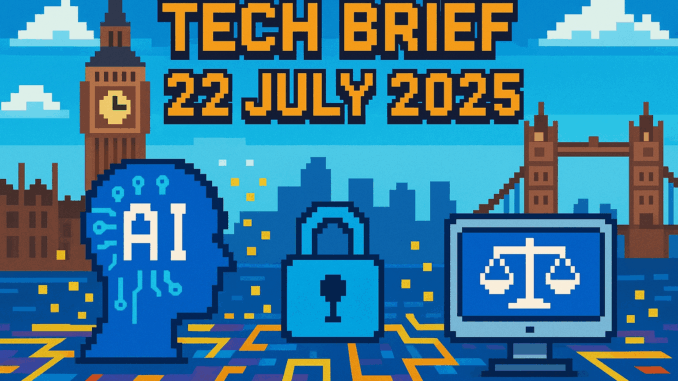
There’s a certain comfort in the morning ritual: coffee in hand, screen aglow, and the steady pulse of headlines reminding us that our digital world never stands still. Tech Brief 22 July 2025 delivers the biggest UK tech stories, from AI partnerships to urgent security alerts and debates about our digital culture. Missed yesterday’s Tech Brief? Catch up here before diving in.
UK and OpenAI Announce Strategic Collaboration on AI Security
Britain has inked a new deal with OpenAI, the company behind ChatGPT, to deepen collaboration on artificial intelligence (AI) security and research. It is not just about headlines or political posturing; the agreement includes plans for UK-based data centers and a focus on safety, ethical deployment, and technical standards for large language models (LLMs).
This move puts the UK in the thick of global AI development, drawing on a tradition that stretches back to the era of British computing pioneers, such as Acorn and ARM, and visionaries like Sophie Wilson, whose work on the BBC Micro and ARM architecture quietly set the stage for today’s AI breakthroughs. For developers and users, it signals a future shaped by homegrown expertise and a renewed national tech identity. The hope is that the UK will help define how AI is built, governed, and trusted worldwide.
Microsoft Urges Immediate Patch for SharePoint Zero-Day Flaw
If you’ve ever felt that familiar jolt of anxiety when a security alert lands in your inbox, Microsoft’s latest SharePoint warning will strike a chord. A flaw known as “ToolShell” is being actively exploited, and Microsoft has urged everyone to patch affected systems without delay. The vulnerability allows remote code execution, letting attackers take control of enterprise servers via the internet.
We all remember the scramble to patch systems when Blaster or SQL Slammer hit – some tech rituals never change, even as the threats evolve. Over the years, patching has become a routine part of digital life. Today’s urgency is a direct result of lessons learned from those outbreaks. Organizations are reminded to prioritize good security hygiene, while anyone running their own kit should double-check for updates. The risks of leaving software unpatched have only grown, but so have our tools for staying ahead.
Meta Faces Criticism Over Military Drone Crowdfunding Ads
Consumer watchdogs have called out Meta’s platforms, including Facebook and Instagram, for hosting ads that solicited crowdfunding for Israeli military drones. These ads sought direct support for sniper teams and drone units, in clear violation of Meta’s own advertising policies. The controversy has reignited debate about tech companies’ responsibility for the content they host.
Since the early internet, questions about platform accountability have persisted. The tools and scale may change, but the underlying challenge remains: how should companies police their digital spaces? For users, this raises concerns about transparency and trust in the information they see online. For the industry, it is another prompt to revisit content moderation strategies and enforce clear standards, especially when sensitive topics are involved.
West Midlands Hospices Secure £3 Million for Tech Upgrades
A cluster of hospices in the Black Country and Staffordshire has landed nearly £3 million in government funding for building improvements and technology upgrades. The investment aims to modernize care delivery and give staff better digital tools, reflecting a broader commitment to leveling up regional healthcare infrastructure.
With the rise of community-driven tech initiatives throughout British computing history, local innovation has often played a vital role in shaping national progress. Today’s investment continues that tradition by empowering regional organizations to adopt digital solutions tailored to their needs. The immediate gains could be felt in everything from improved record-keeping to smoother communication and better care coordination for patients, staff, and families.
From the Wayback Machine
On This Day: 1997 – Apple Announces Mac OS 8
Apple’s Mac OS 8 launched on 22 July 1997, introducing the Platinum interface, a multithreaded Finder, and integrated Internet tools. It was a lifeline for Apple during a period of financial instability, selling over 1.2 million copies in just two weeks. Mac OS 8’s Platinum interface was as much a leap forward for design as swapping a beige box for a sports car – suddenly, using a Mac felt modern again. Features like the Platinum UI and HFS Plus file system influenced later operating systems. Today, the drive for user-friendly design and platform resilience can be traced back to this pivotal moment in Apple’s history.
What This Means
Tech Brief 22 July 2025 shows how today’s stories build on decades of innovation, community, and accountability. Whether it is AI partnerships, urgent security fixes, or digital culture debates, our digital present is shaped by lessons from the past. Let’s keep learning and building together.
Let’s keep patching, stay curious, and remember: every update is a new chapter in our shared digital story.
Missed yesterday’s Tech Brief? Catch up here.

Leave a Reply